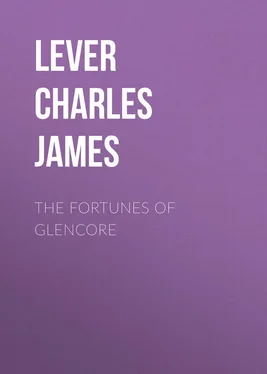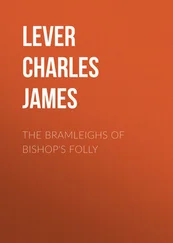Charles Lever - The Fortunes Of Glencore
Здесь есть возможность читать онлайн «Charles Lever - The Fortunes Of Glencore» — ознакомительный отрывок электронной книги совершенно бесплатно, а после прочтения отрывка купить полную версию. В некоторых случаях можно слушать аудио, скачать через торрент в формате fb2 и присутствует краткое содержание. Жанр: literature_19, foreign_antique, foreign_prose, на английском языке. Описание произведения, (предисловие) а так же отзывы посетителей доступны на портале библиотеки ЛибКат.
- Название:The Fortunes Of Glencore
- Автор:
- Жанр:
- Год:неизвестен
- ISBN:нет данных
- Рейтинг книги:4 / 5. Голосов: 1
-
Избранное:Добавить в избранное
- Отзывы:
-
Ваша оценка:
- 80
- 1
- 2
- 3
- 4
- 5
The Fortunes Of Glencore: краткое содержание, описание и аннотация
Предлагаем к чтению аннотацию, описание, краткое содержание или предисловие (зависит от того, что написал сам автор книги «The Fortunes Of Glencore»). Если вы не нашли необходимую информацию о книге — напишите в комментариях, мы постараемся отыскать её.
The Fortunes Of Glencore — читать онлайн ознакомительный отрывок
Ниже представлен текст книги, разбитый по страницам. Система сохранения места последней прочитанной страницы, позволяет с удобством читать онлайн бесплатно книгу «The Fortunes Of Glencore», без необходимости каждый раз заново искать на чём Вы остановились. Поставьте закладку, и сможете в любой момент перейти на страницу, на которой закончили чтение.
Интервал:
Закладка:
“You of all men living to lead such a life as this! a fellow that never could cram occupation enough into his short twenty-four hours,” broke in Harcourt.
Glencore’s pale cheek flushed slightly, and an impatient movement of his fingers on the table showed how ill he relished any allusion to his own former life.
“Charley will show you to-morrow all the wonders of our erudition. Harcourt,” said he, changing the subject; “we have got to think ourselves very learned, and I hope you ‘ll be polite enough not to undeceive us.”
“You ‘ll have a merciful critic, Charley,” said the Colonel, laughing, “for more reasons than one. Had the question been how to track a wolf or wind an antelope, to outmanoeuvre a scout party or harpoon a calf-whale, I’d not yield to many; but if you throw me amongst Greek roots or double equations, I ‘m only Samson with his hair en crop! ”
The solemn clock over the mantelpiece struck ten, and the boy arose as it ceased.
“That’s Charley’s bedtime,” said Glencore, “and we are determined to make no stranger of you, George. He ‘ll say good-night.”
And with a manner of mingled shyness and pride the boy held out his hand, which the soldier shook cordially, saying, —
“To-morrow, then, Charley, I count upon you for my day, and so that it be not to be passed in the library I ‘ll acquit myself creditably.”
“I like your boy, Glencore,” said he, as soon as they were alone. “Of course I have seen very little of him; and if I had seen more I should be but a sorry judge of what people would call his abilities. But he is a good stamp: ‘Gentleman’ is written on him in a hand that any can read; and, by Jove! let them talk as they will, but that’s half the battle of life!”
“He is a strange fellow; you’ll not understand him in a moment,” said Glencore, smiling half sadly to himself.
“Not understand him, Glencore? I read him like print, man. You think that his shy, bashful manner imposes upon me; not a bit of it; I see the fellow is as proud as Lucifer. All your solitude and estrangement from the world have n’t driven out of his head that he’s to be a Viscount one of these days; and somehow, wherever he has picked it up, he has got a very pretty notion of the importance and rank that same title confers.”
“Let us not speak of this now, Harcourt; I’m far too weak to enter upon what it would lead to. It is, however, the great reason for which I entreated you to come here. And to-morrow – at all events in a day or two – we can speak of it fully. And now I must leave you. You ‘ll have to rough it here, George; but as there is no man can do so with a better grace, I can spare my apologies; only, I beg, don’t let the place be worse than it need be. Give your orders; get what you can; and see if your tact and knowledge of life cannot remedy many a difficulty which our ignorance or apathy have served to perpetuate.”
“I ‘ll take the command of the garrison with pleasure,” said Harcourt, filling up his glass, and replenishing the fire. “And now a good night’s rest to you, for I half suspect I have already jeopardied some of it.”
The old campaigner sat till long past midnight. The generous wine, his pipe, the cheerful wood-fire, were all companionable enough, and well suited thoughts which took no high or heroic range, but were chiefly reveries of the past, – some sad, some pleasant, but all tinged with the one philosophy, which made him regard the world as a campaign, wherein he who grumbles or repines is but a sorry soldier, and unworthy of his cloth.
It was not till the last glass was drained that he arose to seek his bed, and presently humming some old air to himself, he slowly mounted the stairs to his chamber.
CHAPTER V. COLONEL HARCOUUT’S LETTER
As we desire throughout this tale to make the actors themselves, wherever it be possible, the narrators, using their words in preference to our own, we shall now place before the reader a letter written by Colonel Harcourt about a week after his arrival at Glencore, which will at least serve to rescue him and ourselves from the task of repetition.
It was addressed to Sir Horace Upton, Her Majesty’s Envoy at Stuttgard, one who had formerly served in the same regiment with Glencore and himself, but who left the army early to follow the career of diplomacy, wherein, still a young man, he had risen to the rank of a minister. It is not important, at this moment, to speak more particularly of his character, than that it was in almost every respect the opposite of his correspondent’s. Where the one was frank, open, and unguarded, the other was cold, cautious, and reserved; where one believed, the other doubted; where one was hopeful, the other had nothing but misgivings. Harcourt would have twenty times a day wounded the feelings, or jarred against the susceptibility, of his best friend; Upton could not be brought to trench upon the slightest prejudice of his greatest enemy. We might continue this contrast to every detail of their characters; but enough has now been said, and we proceed to the letter in question:
Glencore Castle. Dear Upton, – True to my promise to give you early tidings of our old friend, I sit down to pen a few lines, which if a rickety table and some infernal lampblack for ink should make illegible, you ‘ll have to wait for the elucidation till my arrival. I found Glencore terribly altered; I ‘d not have known him. He used to be muscular and rather full in habit; he is now a mere skeleton. His hair and mustache were coal black; they are a motley gray.
He was straight as an arrow – pretentiously erect, many thought; he is stooped now, and bent nearly double. His voice, too, the most clear and ringing in the squadron, is become a hoarse whisper. You remember what a passion he had for dress, and how heartily we all deplored the chance of his being colonel, well knowing what precious caprices of costly costume would be the consequence; well, a discharged corporal in a cast-off mufti is stylish compared to him. I don’t think he has a hat – I have only seen an oilskin cap; but his coat, his one coat, is a curiosity of industrious patchwork; and his trousers are a pair of our old overalls, the same pattern we wore at Hounslow when the King reviewed us.
Great as these changes are, they are nothing to the alteration in the poor fellow’s disposition. He that was generous to munificence is now an absolute miser, descending to the most pitiful economy and moaning over every trifling outlay. He is irritable, too, to a degree. Far from the jolly, light-hearted comrade, ready to join in the laugh against himself, and enjoy a jest of which he was the object, he suspects a slight in every allusion, and bristles up to resent a mere familiarity as though it were an insult.
Of course I put much of this down to the score of illness, and of bad health before he was so ill; but, depend upon it, he’s not the man we knew him. Heaven knows if he ever will be so again. The night I arrived here he was more natural, more like himself, in fact, than he has ever been since. His manner was heartier, and in his welcome there was a touch of the old jovial good fellow, who never was so happy as when sharing his quarters with a comrade. Since that he has grown punctilious, anxiously asking me if I am comfortable, and teasing me with apologies for what I don’t miss, and excuses about things that I should never have discovered wanting.
I think I see what is passing within him; he wants to be confidential, and he does n’t know how to go about it. I suppose he looks on me as rather a rough father to confess to; he is n’t quite sure what kind of sympathy, if any, he ‘ll meet with from me, and he more than half dreads a certain careless, outspoken way in which I have now and then addressed his boy, of whom more anon.
Читать дальшеИнтервал:
Закладка:
Похожие книги на «The Fortunes Of Glencore»
Представляем Вашему вниманию похожие книги на «The Fortunes Of Glencore» списком для выбора. Мы отобрали схожую по названию и смыслу литературу в надежде предоставить читателям больше вариантов отыскать новые, интересные, ещё непрочитанные произведения.
Обсуждение, отзывы о книге «The Fortunes Of Glencore» и просто собственные мнения читателей. Оставьте ваши комментарии, напишите, что Вы думаете о произведении, его смысле или главных героях. Укажите что конкретно понравилось, а что нет, и почему Вы так считаете.












